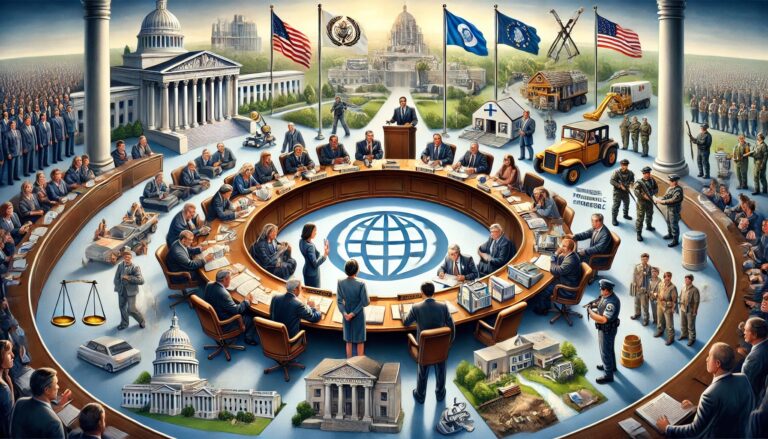When a politician says he is “ready to govern”, what does he mean by “govern”? Oxford English Dictionary tells us that the verb “to govern” comes from a French word and first appeared in English in the 14th century. In its intransitive form, it meant “to direct or control the actions and affairs of a people or place” (OEDaccessed July 2, 2024).
What we can call the naive The conception of governance is that it is a way to please everyone, to make everyone happier. But it is not obvious how individuals with different preferences, values, and circumstances can all be made happier by government decisions and policies. Moreover, how are leaders incentivized to be benevolent angels? What we know from history suggests otherwise.
The most realistic majority The design of government focuses on satisfying the majority of society’s members, presumably the group of voters whose support is most needed by the rulers. Majoritarian democracy means that the majority is not constrained by a constitution. If you are in the minority, you are likely to be exploited by the majority, that is, you will pay (in money, through discrimination, or otherwise) for the benefits and privileges offered to the majority. Note that nondemocratic governments often have to respond to the demands of a significant majority or plurality. In a democratic regime, however, a citizen who is a minority is more likely to be part of a future majority and have a turn to exploit others.
The majoritarian conception of government is questionable both economically and morally. Morally, some individuals may find themselves stuck in a permanent minority and never get their turn to rule and exploit others. Economically, being alternately or cyclically among exploiters and exploited may result in a net benefit, but the average is calculated on a lower level of wealth. The reason is that the constant interference of the ruling majority with free trade and free social interaction in general (which is what exploitation is about) reduces the overall level of wealth.
A more sophisticated conception of governance can be called “public good” or “contractualist.” Governing then means directing a subset of social affairs in such a way as to ensure the production of public goods (or services)goods that everyone desires but which cannot be obtained at an “efficient” level through voluntary cooperation.
The idea of a “social contract” in its liberal version can be seen as an extension of the public good approach. To govern is to direct or guide social affairs according to general rules on which its members unanimously agree. Unanimous agreement on a set of rules (the “constitution”) implies that each member of society derives a net benefit from it, even if specific policy decisions made under these rules may sometimes go against his or her interests. No one can be consistently exploited. We owe the most developed form of this conception to James Buchanan, Gordon Tullock, and the related school of constitutional political economy (see especially James Buchanan and Gordon Tullock, Calculating consent1962; and Geoffrey Brennan and James Buchanan, The reason for the rules1985). Many, perhaps most, liberal thinkers from Adam Smith to Friedrich Hayek can be seen to have adopted a related but less formalized theory, according to which all government action must respect rules and institutions that command broad consensus (where “broad” means much more than 50% + 1).
As attractive as the formal or informal contractual approach may be, is it realistic to think that submission to a government can be in the interest of virtually everyone? For Anthony de Jasay, the answer is no. Any coercive act of government and even any general rule or set of supposedly unanimous rules must favor some citizens and harm others. There is no way other than the arbitrariness of political authority to decide that the benefits to some outweigh the costs borne by others (see in particular Jasay’s 1985 book). The state). To govern is nothing more than to benefit some by harming others: to take money from some and transfer it to others, or to grant privileges to some (a tariff to protect some producers from foreign competitors, for example) at the expense of others (consumers pay higher prices). Government can produce public goods at a level that would otherwise be impossible to achieve, but then it becomes the place where free riders get free goods at the expense of other taxpayers (see de Jasay’s Social contract, special treatment(1992).
De Jasay’s theory is consistent with current observations in the democratic world: a significant portion of the population hates its democratic leaders, and governing more to resolve public discontent only makes it worse. While many aspects of his theory are debatable, I do not think the challenges it raises have been convincingly addressed.
********************************
I asked ChatGPT, “What does it mean to ‘govern’ or ‘governing,’ as when we say that political leaders govern?” In short, he replied that the goal of leaders is “to ensure the stability, security, and well-being of their society.” But he admitted that “governing requires balancing various interests and making difficult decisions.” In other words, harming some to benefit others. I then asked him, “Generate an image that illustrates the concept of government you just explained.” The image he produced is as confusing as his conception of democracy.

The first image of Chat GPT after being asked to illustrate what it means to govern, as when we say that political leaders govern


